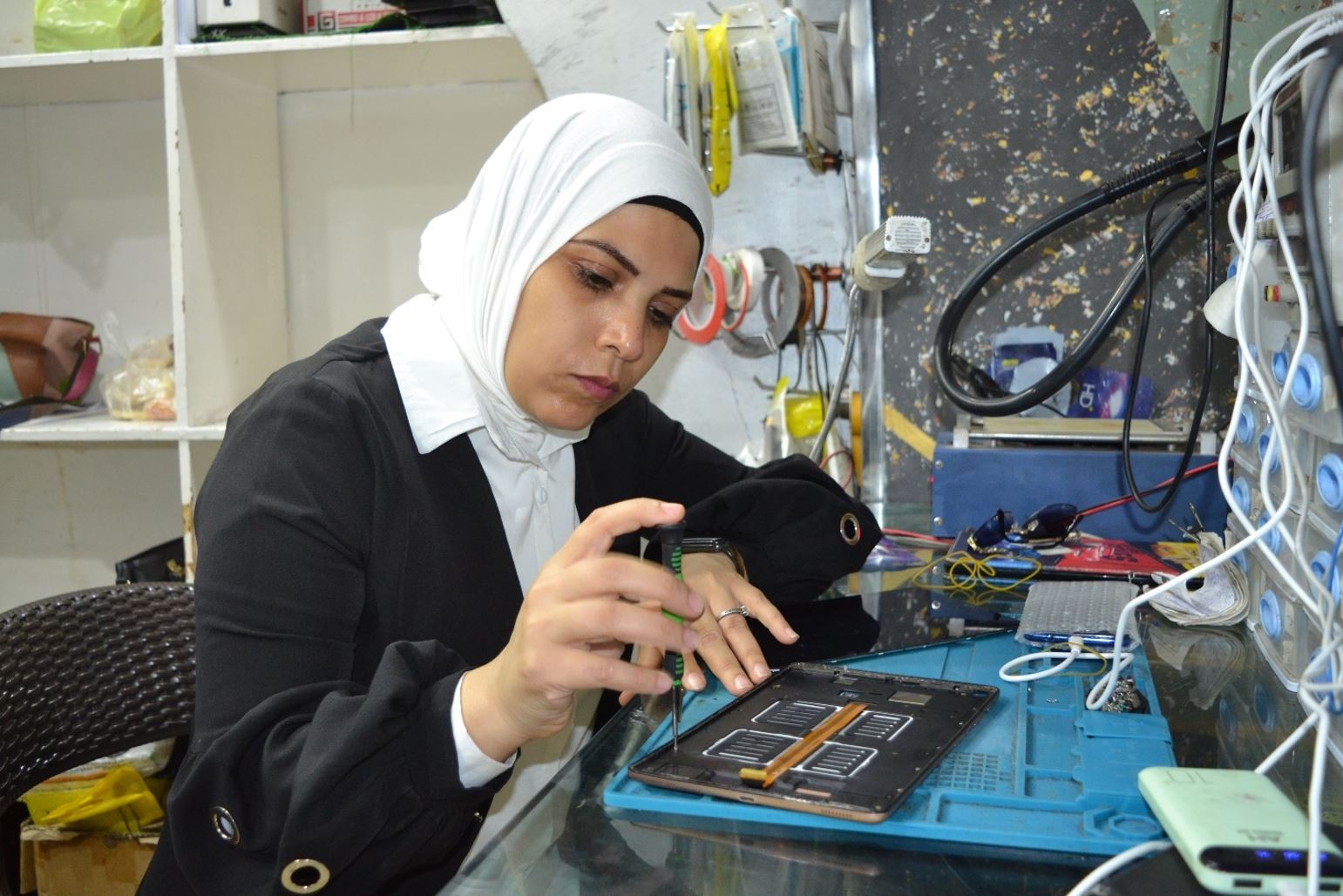In the words of Heba Hussein: I plan on becoming the first woman in my community to run her very own mobile repair shop.
Date:

After graduating from the Institute of Computer Science, Heba Hussein’s love for all things digital was put on the back burner as she was swept away with the responsibilities of marriage and childcare. However, she did not give up on her passion for exploring technology. Now, at 40, she's pursuing her passion by joining the training on mobile repair offered by UN Women and embarking on an exciting new chapter in her life.
“Technology has become a constant in our lives, and we are utterly dependent on our phones and computers. Holding such an important part of our day-to-day, I have always been intrigued by these devices that contain our life. I am interested to know everything about them and explore their ins and outs. I would often watch informative videos and tutorials online, but I believe that the most impactful learning comes through hands-on exploration.
As I needed to bridge the gap between theory and practice, I applied to the mobile repair training once I learned about it online. The training included a hands-on experience at a local mobile shop. This month-long training provided me with first-hand knowledge of what it takes to be a mobile repair expert. This practical experience solidified my passion for this field and equipped me with the skills to excel.
The training covered everything from “a to z”, including full replacements and repairs to important functions in devices. I learned how to open the device and examine it to identify the exact problem and how to repair it. I can now confidently handle intricate work in the motherboard and fix the most common mobile issues, such as repairing or replacing charging sockets and volume and power buttons. Handling malfunctioning or broken screens has also become a piece of cake for me, and I can now assess the exact issue and whether it can be fixed or needs a full replacement.
UN Women's training wasn't just about acquiring new skills; it became the key that unlocked my first professional opportunity. I had always been too preoccupied with family care and the thought of getting employed had never crossed my mind. Now, however, working part-time at the mobile shop has me brimming with excitement at the thought of starting a new journey, fueled by my hunger to expand my knowledge further and refine my newfound skills.
I am proud, not only of my achievements so far, but that I am one of very few women in this male-dominated field. Soon, after I have gained enough experience to be a seasoned professional, I plan on becoming the first woman in my community to run her very own mobile repair shop. I believe that women can excel in any profession, and I am determined to prove it.
This experience has not only sharpened my technical knowledge, but it has also improved my interpersonal skills. I now understand the importance of working seamlessly within a team and the delegation of tasks to run a business efficiently. I also mastered the art of tailoring my communication style with different people and the need for flexibility to run a successful business. This transformation has instilled in me confidence with a sense of enhanced professionalism and a solid knowledge base.
I encourage every woman to begin a journey of self-discovery, where she can explore unfamiliar territory and ignite a new passion within her. By expanding oneself’ s horizon, we gain a new and fresh perspective on life. With this comes a surge of positive energy for “dreams coming true”, that pushes us to achieve our goals and accomplish something for ourselves.
***
Heba is one of the one of the participants of the technical trainings organized under “Women’s Economic Empowerment in Egypt” programme, which aims to economically empower women through access to capacity development and decent employment opportunities. To achieve this goal, the programme provided technical trainings for women entrepreneurs and job seekers on different professions, such as mobile repair, handmade leather products, accessories making, catering, fashion designs (sewing), and beauty care.
This programme is implemented by UN Women Egypt in partnership with the National Council for Women, the Ministry of International Cooperation, and the Ministry of Labour, with the generous support of the Korean International Cooperation Agency (KOICA). The training that Heba joined was delivered by Qodra for Development and Technological Solutions for Education.